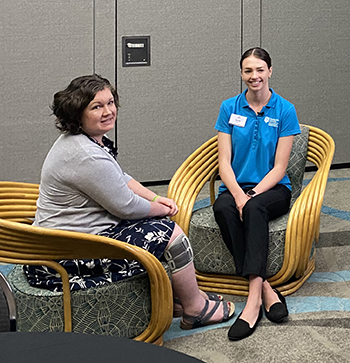During ten years as a speech pathologist Dr Kirstine Shrubsole encountered Aphasia on a daily basis, seeing great improvements in some patients while others remained stuck, some indefinitely. Aphasia, a neurological disorder caused by damage to the portion of the brain that is responsible for language, commonly affects 30 per cent of stroke victims.
“When you work in a hospital there are guidelines that tell us what we should be doing and when, based on the research, but when I was working in the hospitals myself we often couldn’t implement them,” Dr Shrubsole says.
“There were so many barriers. We often didn’t have enough staff, or time, or resources. Sometimes it was skills; we didn’t have the training to deliver a certain type of therapy.”
She went on to complete a PhD, researching aphasia and more specifically, the implementation of clinical guidelines and effective behaviour change techniques in order to improve speech pathology practice and aphasia treatment within the hospital system.
Now Dr Shrubsole is passing on what she’s learned to Southern Cross University students, helping them understanding the latest research and evidence so they graduate well prepared.
Sarah Eenjes, a final-year speech pathology student, recently attended an Aphasia Camp on the Gold Coast https://www.youtube.com/watch?v=TS85LOOLo_E&t=15s organised by the Australian Aphasia Association to gain first-hand experience from patients working to improve their ability to communicate.
“It's one of my passions, being able to help those with aphasia, as not many people know about aphasia and the camp was an invaluable learning experience,” Sarah said.
“Being at Southern Cross has given me opportunities that other universities may not have provided, like the small classes and knowing your teachers by name, just that really close group of people that we've got and being able to share our resources between each other.”
Dr Shrubsole’s goal is to improve the care delivered to stroke patients across Australia so that no matter which hospital they attend, they receive the same high-quality care based on the latest evidence.
She says it is a matter of approaching things from the top down and bottom up simultaneously.
“All of my research is based on trying to improve how the latest evidence is translated into practice. It’s called closing the evidence/practice gap,” Dr Shrubsole adds.
More on Dr Kirstine Shrubsole’s research work is here.
















